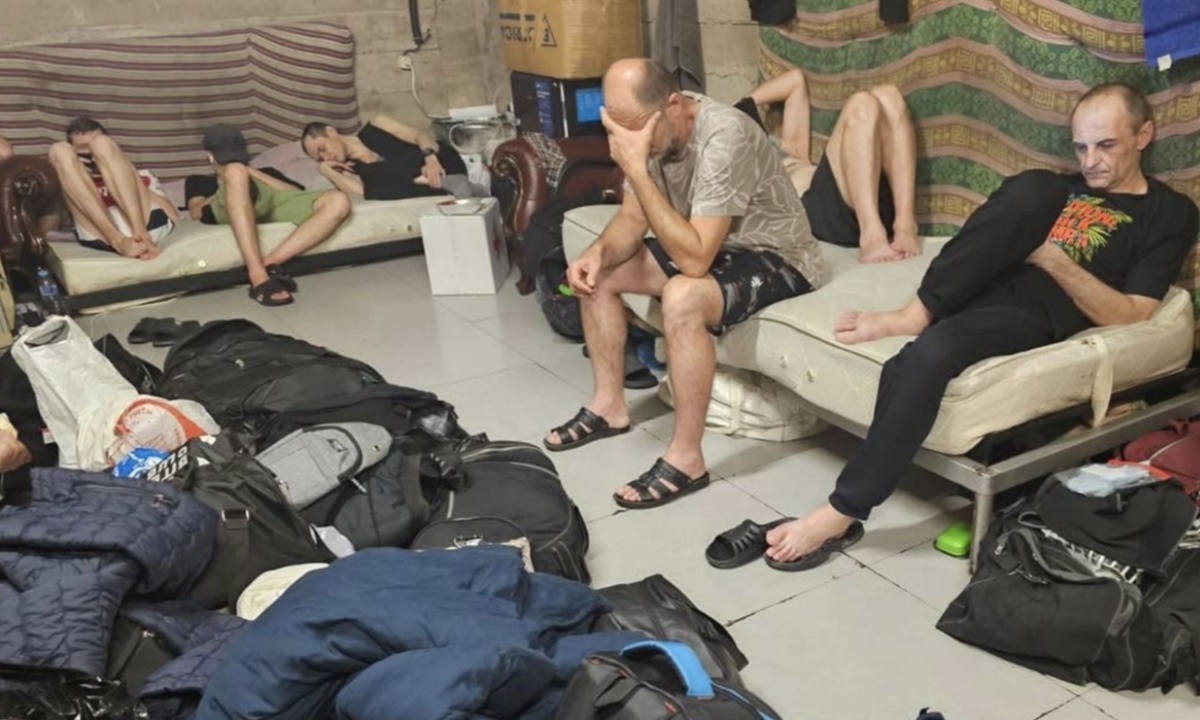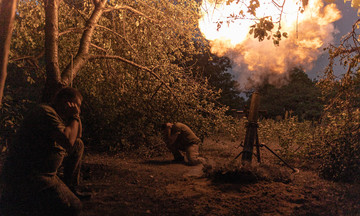More than 90 Ukrainians, mostly former prisoners deported by Russia after serving their sentences, are under close watch by Georgian border guards in a damp basement at the southern end of the Dariala Gorge. Some were deported for other reasons, such as immigration paperwork issues. Unable to cross into Ukraine due to the heavily mined conflict zone at the border, and denied entry into Georgia due to their criminal records, some have been living in this basement for nearly two months.
On 20/7, their frustration boiled over into a protest. "We're not allowed to go outside!" a man shouted as security personnel surrounded them.
 |
Ukrainians deported by Russia wait in an underground basement at the Russia-Georgia border. Photo: Moscow Times |
Ukrainians deported by Russia wait in an underground basement at the Russia-Georgia border. Photo: Moscow Times
"We are being tortured," another said. "It's incredibly damp, there are people with disabilities without medical care, there's nothing here."
Amidst the tension and despair, one man injured himself during the protest. "He's been here for over a month," 45-year-old Nikolai Lopata explained. "They promised twice to get him out. He bought bus tickets, but they never gave him his money back." According to Lopata, the man suffers from anxiety and has been repeatedly denied transit through Georgia to Ukraine.
An ambulance arrived after over an hour. Medics bandaged the man's wound and left. The man, around 40 years old, was not hospitalized and remains at the checkpoint, according to volunteers.
Lopata said he and the others were held in prisons in Russia or Russian-controlled territories in Ukraine. Released in recent months, they are now trapped in limbo. "Georgian border guards hold our documents. They don't let us in or out. They keep saying 'tomorrow, tomorrow.' Some have been here for over a month and a half in unbearable conditions," Lopata said.
Originally from Dnipro, central Ukraine, Lopata has lived in Russia since 2005, where he married a Russian woman and has two children. Convicted of murder in 2010, he was held in a deportation center for a year after his release in 2024. Returning to Ukraine during the height of the conflict was impossible.
"Last summer, Russian authorities said they would send me to Georgia. Then, in the winter, they promised to send me back to Ukraine via Belarus. Then they brought us to the Georgian border, where we were told they would accept us. But Georgia refused," Lopata recounted.
Instead, upon arrival on 4/7, Georgian border guards photographed and fingerprinted him, confiscated his documents, and led him to the basement. "We do nothing, just sit in the basement all day," Lopata said, adding that they have to sleep in shifts due to only having 40 beds.
The deportees receive minimal supplies and no regular medical support. Ambulances provide emergency care. "The ambulance comes almost every day, sometimes twice, because we have people with disabilities and illnesses," Lopata said, noting some suffer from epilepsy, HIV, and tuberculosis. "But they only offer temporary solutions. Yesterday, they gave someone painkillers and said, 'That's it, we can't do anything more,'” he said.
Activists and volunteers bring essential supplies weekly. Food, household items, and hygiene products are provided by Volunteers Tbilisi, an organization supporting Ukrainian refugees in Georgia. "There's no fresh air, it's very hot, and the basements are sealed," said Maria Belkina, a manager at Volunteers Tbilisi. "It's definitely not a place where you can live."
Anna Skripka, a lawyer with the NGO Protecting Ukrainian Prisoners, described the situation as a "humanitarian disaster" that began in 2023 and has worsened over the past two years. Some have become so desperate they have attempted suicide, she said.
"They don't understand what's happening," Skripka said. "The conditions are hellish." Currently, 84 men and 7 women are held at the Georgian checkpoint. The women have a separate room, but conditions remain poor. "Many women complain to me that they aren't allowed to go to the toilet," Skripka said. "They ask us to buy them a bucket with a lid to use in their room."
Previously, deportees were transferred to Moldova and then to Ukraine. This was how Andriy Kolomiyets returned home earlier this month after serving 10 years in Russia for drug-related offenses and attempted murder.
Skripka explained that under a previous agreement, Ukrainian deportees were bused from the border to Tbilisi Airport, flown to Moldova, and then traveled by land to Ukraine. From early June to July, nearly 40 Ukrainians were repatriated this way. However, 4 individuals exploited the agreement to stay illegally in Moldova.
They were later returned to Ukraine, Skripka said, but Moldova ended the program in mid-July, stating they "didn't want to risk it anymore." Georgia also refuses transit, citing the criminal records of many deportees. "Most of these individuals have criminal pasts and have been convicted multiple times for serious or especially serious crimes," the Georgian Ministry of Foreign Affairs stated.
Skripka argues that labeling them all as criminals is unfair. Some were deported for lack of proper documentation. Others had their Russian citizenship revoked.
She believes Georgia's treatment of the deportees raises serious legal and ethical questions. The situation is complicated by many deportees lacking valid identification. Ukraine has issued "white passports," emergency travel documents, but these are only valid for 30 days.
Some Ukrainian politicians have spoken out about the stranded citizens. "We are actively working with Georgia and Moldova for their safe return," said Ukrainian Foreign Minister Andrii Sybiha. "To avoid complicating the situation, we publicly offered Russia to bring these Ukrainian citizens to the border where we would receive them. There are appropriate border areas for this."
Upon return to Ukraine, the deportees face thorough security checks. "They were in Russia for a long time. Anything could have happened. They could have been recruited by Russian intelligence. This is a matter of Ukraine's national security," Skripka explained.
In March, Russian President Vladimir Putin decreed that Ukrainians in Moscow-controlled territories must leave or accept Russian citizenship by 10/9. This could lead to a surge in deportations in the coming months.
Lopata desperately wants to leave the Georgian border checkpoint, even though he doesn't necessarily have a home to return to. "My home in Ukraine was bombed. My parents were killed, and I don't know where to go," he said. "I just want to get out of here at any cost."
Vu Hoang (Al Jazeera, AFP, Reuters)












